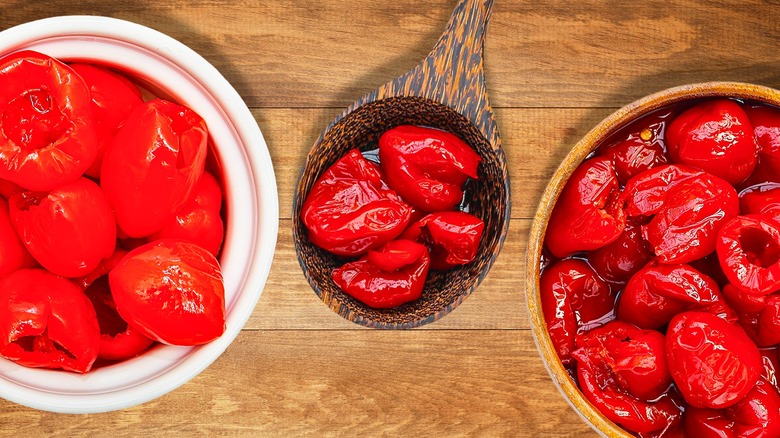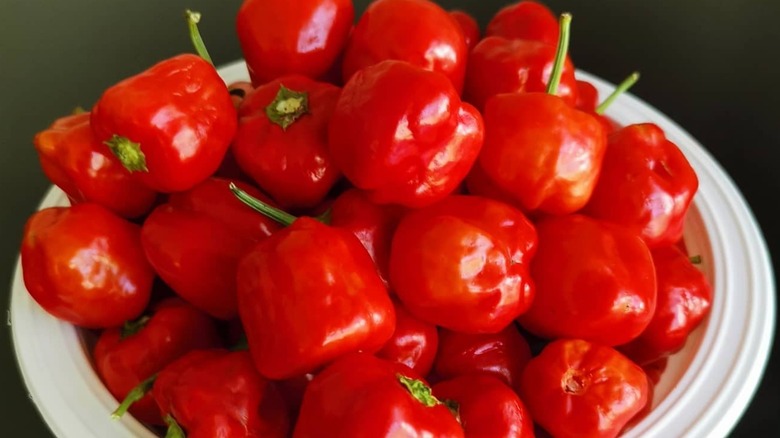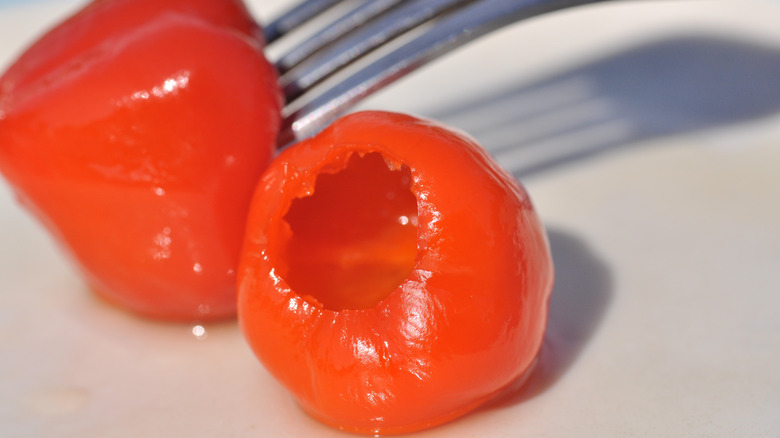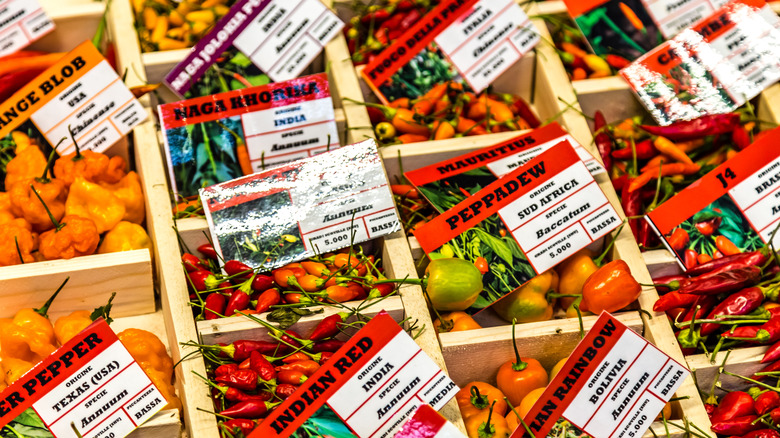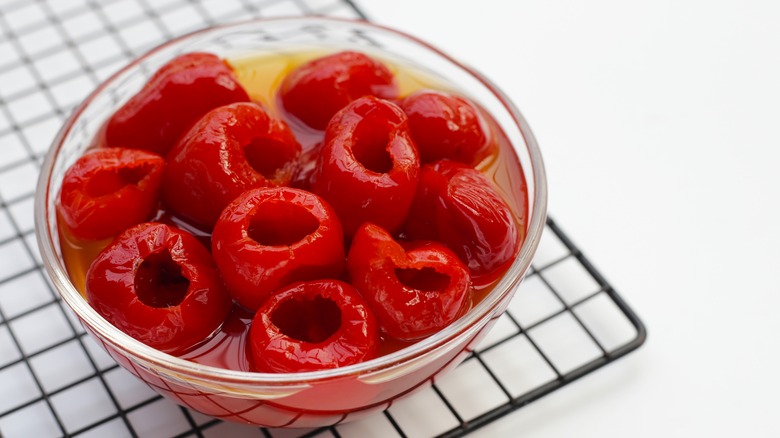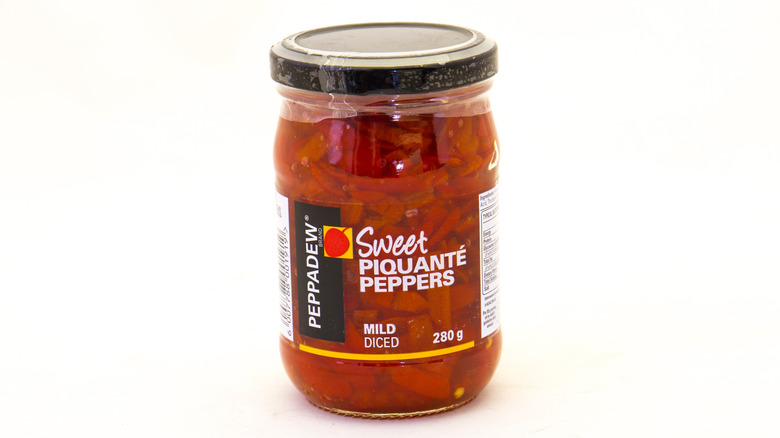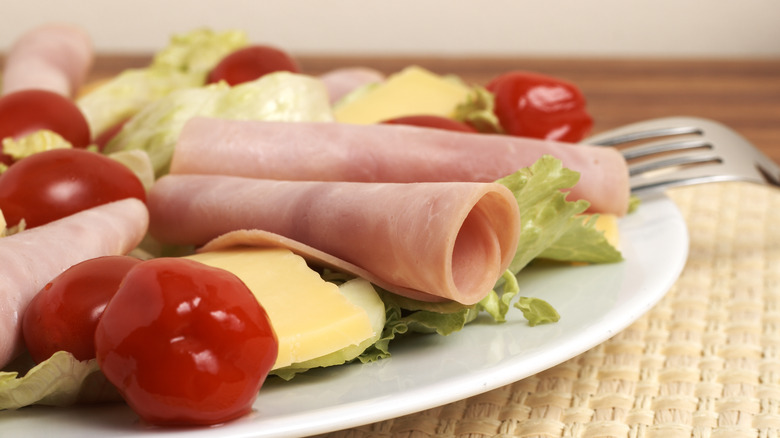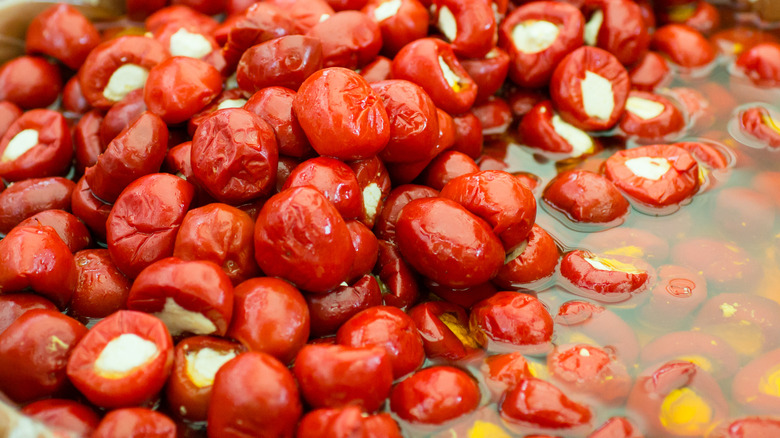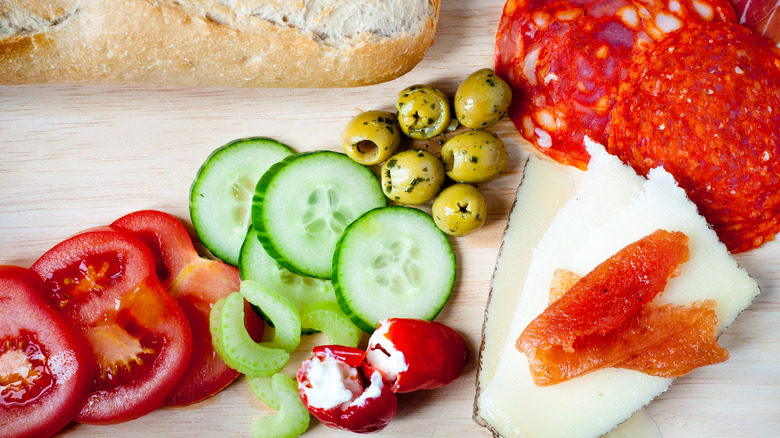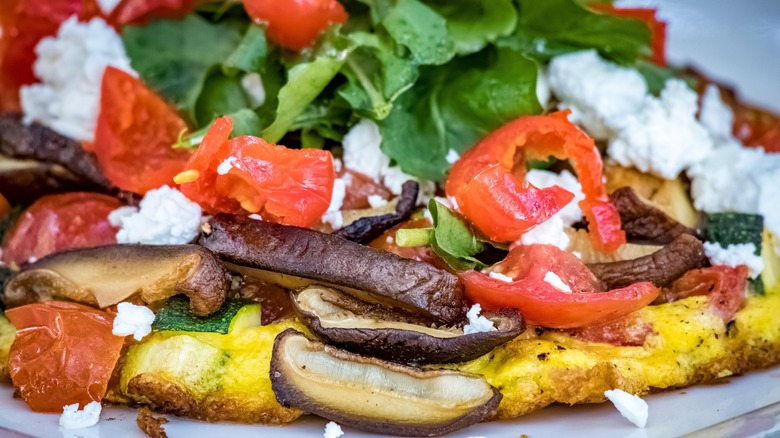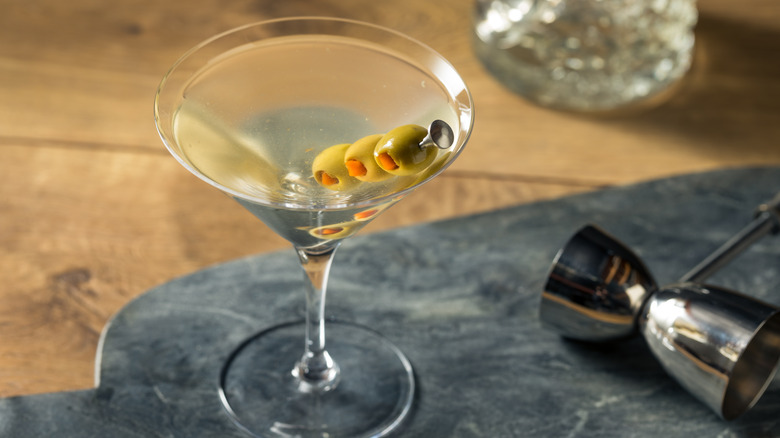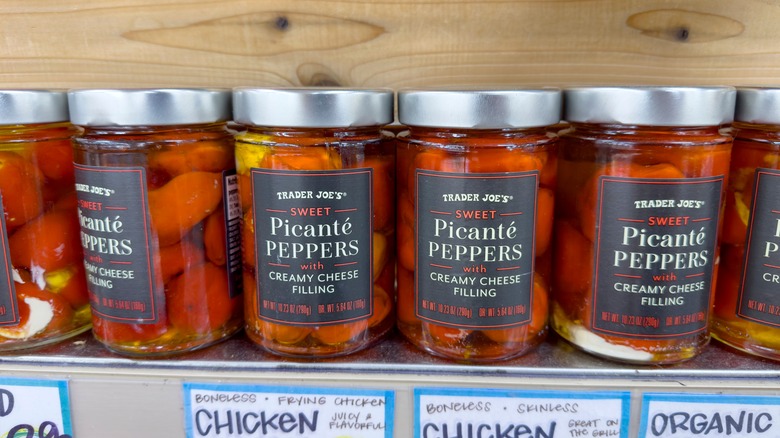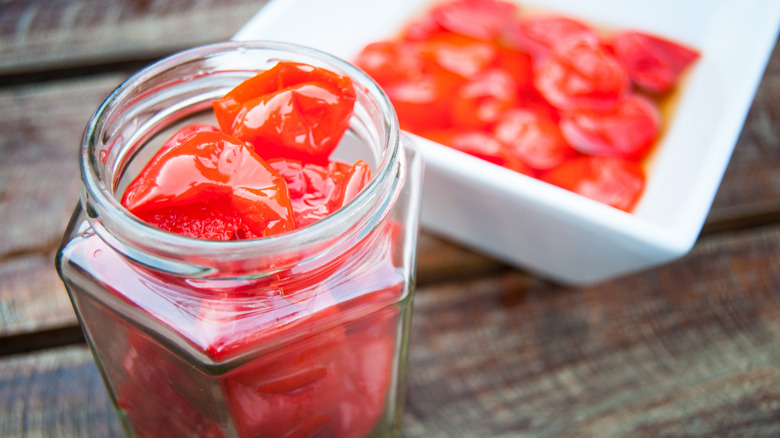What Exactly Is A Peppadew?
We may receive a commission on purchases made from links.
While 'Peppadew pepper' may be a bit of a tongue twister, it's absolutely worth getting to know the pepper behind the name. Though they look similar to other types of peppers, Peppadews are uniquely flavorful and lend themselves well to a wide variety of uses in the kitchen. You may have come across them in charcuterie and cheese boards or in the olive section of your local grocery store deli, but they're so much more than a simple garnish. These underrated peppers add both a pop of color and flavor to any dish, making them the perfect way to elevate your cooking and impress guests at your next dinner party.
From appetizers to the main course, Peppadew peppers complement a wide range of cuisines. Plus, they're also delicious all on their own. Even if you've never heard of them before, now is a great opportunity to learn more about these special peppers and all the ways you can take advantage of them in your cooking. To provide the best information, we consulted several experts on the best ways to choose, prep, and cook with Peppadew peppers.
What is a Peppadew?
Peppadew peppers are a part of the Capsicum baccatum species, which encompasses peppers of varying shapes, sizes, and flavor profiles. Among the notable members of this species are Aji Amarillo, Sugar Rush Peach, and Lemon Drop peppers, but there are hundreds if not thousands of varieties within Capsicum baccatum. While Peppadew peppers are often confused with cherry peppers due to their similar appearance, the two are completely different species. Cherry peppers belong to Capsicum annuum, making them more closely related to bell peppers and pimento peppers.
Peppadew peppers are round and resemble miniature tomatoes or bell peppers. At 1 to 1.5 inches in diameter, these peppers are small enough to hold several in one hand. Despite their tiny size, they grow on plants that can reach over 4 feet tall and 2 feet wide. When fully ripe, their bright red color and thick, juicy flesh make them stand out. These peppers grow best in full sun and are ready for harvest in late summer and fall.
Peppadew peppers versus piquanté peppers
There's understandably some confusion surrounding the Peppadew pepper name. 'Peppadew' is actually a registered trademark and the name of a company, not the name of the pepper itself. Prior to Peppadew International's founding, there was no such thing as a Peppadew pepper. Based in South Africa, the company produces a variety of pickled peppers, along with spiced pickles, pasta sauces, and hot sauces. While the Peppadew brand has become synonymous with this pepper over the years, it also goes by other names like sweet piquanté pepper, Juanita pepper, and Malawi piquanté pepper.
Peppadew International grows its namesake peppers in South Africa, where it then deseeds them by hand and pickles them in a special brine. There are several ways to enjoy Peppadew International's peppers 一 the company offers mild and hot versions as well as a yellow variety called Goldew.
The origin and history of Peppadew peppers
The Capsicum baccatum species likely originated in Peru or Bolivia, eventually spreading worldwide through trade and cultivation. Despite their South American origin, Peppadew peppers gained popularity in South Africa in 1993. The story goes that Johan Steenkamp stumbled upon the pepper bush in the garden of his holiday home in Plettenberg Bay, a town located in South Africa's Eastern Cape. The property had previously belonged to a botanist, which likely explains the pepper's presence. Certain he'd discovered something special, Steenkamp brought seeds back with him to his farm in Tzaneen, Limpopo, where he began cultivating the peppers for commercial use.
After obtaining breeder's rights for the plant in 2013, Steenkamp trademarked the name "Peppadew," combining the words "pepper" and "dew." This marked the official launch of the Peppadew brand. Today, Peppadew International owns the rights to the pepper and its name, offering a range of products that are now sold in more than 25 countries around the world.
Peppadew peppers' taste and spice level
Outside of South Africa, Peppadew peppers are most commonly found in their pickled form, which gives them their distinctive flavor. Naturally sweet and fruity, the peppers take on a satisfying tanginess from the pickling brine. Tom Curivan of Peppadew USA sums it up nicely: "Eating these peppers gives you a full tastebud experience. At first bite they are sweet, then you'll experience the tangy flavor and finally a quick zing of heat."
Though their bright red color may suggest intense heat, these peppers are actually quite mild. Petranka Atanasova, Professional Chef at Sunglow Kitchen, notes, "They're less sour than pepperoncini and milder than jalapeños." According to the Scoville scale, a method for measuring spiciness levels, a Peppadew pepper can land anywhere between 500 and 1,500 Scoville heat units, placing it at about the same level as a poblano pepper. For context, a jalapeño typically scores between 2,500 to 8,000 Scoville heat units, making them much spicier — though still far from the spiciest pepper in the world.
Jarred versus fresh Peppadew peppers
You may be wondering about the difference between pickled and fresh Peppadew peppers. While they can be eaten raw, fresh Peppadew peppers don't offer the same depth of flavor of their pickled counterparts. Ranveer Brar, celebrity chef and owner of the restaurant Kashkan, prefers using pickled peppers in his cooking. "The pickled version enhances the taste of the pepper but not the flavor to the extent that it cannot be mixed with too many things."
Brar finds that the sweet and tangy nature of the peppers complements dishes with bolder flavors. "For example, when added to a spicy curry or tomato mawa, the peppers offer a soft enchanting sweetness which helps balance out the heat in the dish," he explains. While fresh Peppadew peppers can also work in many recipes, they lack the punch that makes the pickled version so special. Plus, they can be difficult to find in stores. Pickled Peppadew peppers usually come in jars, cans, or resealable plastic containers and are more widely available.
Health benefits of Peppadew peppers
Like all peppers, Peppadews are a great source of vitamin C, a vital nutrient that helps the body heal itself and make new blood vessels, muscle, and cartilage. They're also high in vitamin A, which plays an important role in reproduction, growth, and eye health. Additionally, peppers contain fiber, potassium, and folic acid, which help with digestion, heart and kidney health, and cell function, to name a few benefits.
While this is all good news, make sure to review the nutrition label on the packaging of any processed or pickled peppers. The brining liquid may contain excessive sugar, sodium, preservatives, and other additives, which some people may want to avoid. To look at a popular example, Peppadew Mild Sweet Piquanté Peppers Whole contain 5 grams of added sugar per serving (⅓ a cup), which is equal to 10% of the maximum daily intake recommended by the FDA. While the FDA doesn't consider this value to be high, it's worth noting, as many people might not expect to find added sugar in a savory product.
Stuffing Peppadew peppers
One of the most common ways to enjoy Peppadew peppers is to stuff them. The pickled peppers have a hole on one end that makes them easy to stuff with various fillings. Petranka Atanasova enjoys preparing the peppers by filling them with cream cheese and herbs, turning them into a quick and tasty appetizer. "They're also delicious stuffed with mini mozzarella balls, coated in breadcrumbs, and fried until golden," she adds.
Ranveer Brar takes a different approach to stuffing peppers. "Stuffed Peppadew peppers are another one of my favorite dishes, especially if the stuffing consists of creamy goat cheese or ricotta and then finished with a quick grill," he explains. Whether grilling, frying, or eating them as is, stuffed peppers are sure to please even the pickiest of eaters. While cheese is by far the most popular filling, meat, spreads, and other veggies also work just as well. For example, Tom Curivan recommends trying sausage or hummus for a quick snack. In other words, the sky's the limit when it comes to potential filling ingredients.
Pairing Peppadew peppers with meat and seafood
Peppadew peppers work well with a variety of meats and proteins, making them versatile for any occasion. Gabrielle Yap, Senior Editor and Culinary Expert at Carnivore Style, explains that the sweetness of the pickled peppers brings complexity and balance to prosciutto, salami, and other salty cured meats often found on charcuterie boards. But their role doesn't end at snack time. Yap shares, "I love incorporating them into a beef stew, where the sweetness cuts through the rich, hearty flavors, or in meatball recipes to add a touch of brightness." She also likes using the peppers in salsa alongside grilled meats, saying, "The peppers balance out the smokiness and add a bit of unexpected sweetness, making the whole dish more dynamic."
Pickled Peppadew peppers also complement lobster, shrimp, and other rich seafoods, according to Matt Bellarose, owner of LobsterOrder.com. "Their acidity cuts through the natural richness of shellfish, making them an ideal addition to lobster rolls, seafood salads, and even lobster mac and cheese." To make his favorite lobster salad, Bellarose mixes together a light mayonnaise with herbs, lemon, and finely chopped Peppadew peppers, which elevate the lobster's delicate flavors.
Other uses for Peppadew peppers in the kitchen
Like with any type of pickle, Peppadew peppers are tasty whether you add them to your favorite recipe or eat them straight out of the jar. There are endless ways to enjoy them. "Bake them into an omelet or quiche, toss them on a salad, sandwich, tacos or pizza," suggests Tom Curivan. He recommends grilling the peppers with your burger, chicken, or steak or chopping them up to garnish your hot dog.
Petranka Atanasova likes using the peppers in a pesto pasta salad, alongside olives, feta cheese, and plenty of other vegetables. Another way to incorporate the peppers in a pasta dish is to blend them into the sauce for an extra burst of tang. The peppers can take any classic recipe to the next level. For example, try adding them to your macaroni salad, tuna salad, grilled cheese, or on top of avocado toast. For the more adventurous, Peppadew International even has chocolate brownie and churro recipes that feature the peppers. Whether it's breakfast, lunch, dinner, or even dessert, Peppadew peppers can add a delicious and interesting dimension to any meal.
How to use pickled Peppadew brine
You may not realize that Pickled Peppadew peppers come with an added bonus: the brine. That's right, this flavorful liquid has many uses that can elevate your cooking. The brine is typically a mix of water, vinegar, sugar, and salt, though some varieties can also include seasonings or extra spice. Petranka Atanasova always saves the brine, explaining that its acidity makes it a tasty addition to different sauces. Tom Curivan agrees, adding, "Our signature brine carries the same delicious flavor as the peppers themselves, making it a great marinade, salad dressing or even cocktail ingredient."
In fact, Curivan notes that a number of restaurants use Peppadew brine to make dirty martinis. To make a Peppadew dirty martini, simply replace the olive brine in the recipe with liquid from your pepper jar. With this substitution, you'll be sure to impress guests at your next cocktail night. If martinis aren't your cup of tea, the brine could also work well in micheladas, Bloody Marys, or in any drink that calls for olive juice or pickles. So, the next time you finish a jar of pickled Peppadew peppers, think twice before pouring the brine (also known as liquid gold) down the drain.
Buying Peppadew peppers
If you have your heart set on fresh Peppadew peppers, you might be out of luck unless you live in South Africa. Still, checking your local farmer's market is never a bad idea, as some farmers may be able to point you in the right direction. If you do find them, Petranka Atanasova says to "look for firm, plump peppers with vibrant colors, typically red or yellow. The skin should be smooth and shiny, without wrinkles or soft spots." For any green thumbs out there, you can order seeds from online sellers, just not under the Peppadew name. Instead, look for Malawi Piquanté Pepper seeds.
Luckily, buying pickled Peppadew peppers is much easier. Many grocery stores and supermarkets sell pickled Peppadews, typically in jars or cans in the olive and pickle section. Some grocery stores or delis may also offer them in the prepared foods or olive bar area. Safeway, Trader Joe's, Wegmans, and Kroger are just a few nationwide chains that sell Peppadew peppers. Alternatively, you can order them from Amazon, Walmart, or another online retailer. When choosing a product, be sure to read the information on the packaging, as some peppers may be packed with preservatives or other undesirable ingredients. Also, keep in mind that there are mild and hot varieties, so choose carefully if you're sensitive to spice.
How to store Peppadew peppers
Storing pickled Peppadew peppers is easy if you purchase them in a jar. After opening them for the first time, simply store the jar in the refrigerator. "Make sure the brine covers the peppers, as this not only preserves their flavor and texture but also prevents them from drying out and spoiling," says Petranka Atanasova. "Also, keeping the jar tightly sealed is key to minimizing exposure to air." Once opened, most pickled peppers can last about a year in the fridge before they begin to decline in quality. However, make sure to enjoy your peppers before the expiration date that's posted on their packaging.
If your peppers come in a non-resealable can or box, transfer them to an airtight container and store them in the fridge after opening. "If purchased from the olive bar, we advise scooping up extra brine as this will keep peppers crunchy and prolong them from any oxidizing and discoloration," says Tom Curivan. If you do manage to find fresh Peppadews, Atanasova recommends keeping the peppers in a paper bag in your fridge's crisper drawer to prolong their freshness. Storing them in a sealed plastic bag, on the other hand, can speed up their spoiling.
